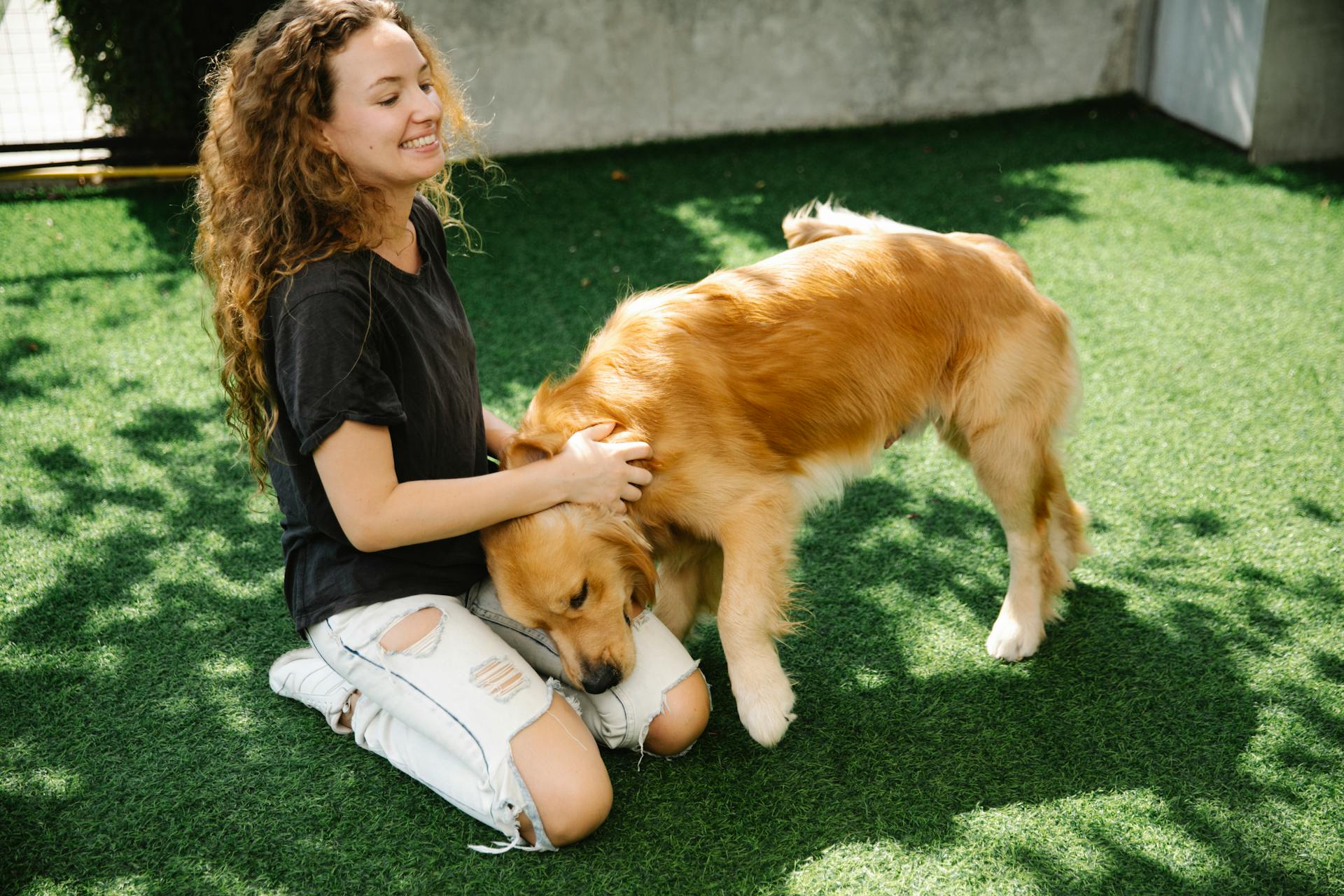
If your dog is still itching after flea treatment, there are several treatment options you can consider.
You can try an oatmeal bath to relieve your dog's itching and irritation.
Consult with your veterinarian before giving your dog any additional medication or treatments.
A medicated shampoo or spray can also help to soothe your dog's skin and reduce itching.
In some cases, a second application of flea treatment may be necessary to fully eliminate the fleas and their eggs.
Causes and Symptoms
If your dog is still itching after flea treatment, it's essential to understand the possible causes and symptoms of this persistent issue.
Excessive scratching can be a sign of various underlying conditions, including allergy, infections, parasites, contact dermatitis, and hormonal disorders.
Some common symptoms of itching, scratching, and chewing in dogs include constant scratching, excessive skin licking, gnawing, rubbing, self-injury, redness of the skin, bald spots, whining, anxiety, and aggravation.
Here are some possible causes of itching in dogs:
- Allergy (atopic dermatitis)
- Infections (yeast, bacteria)
- Parasites (fleas, mites, ticks, lice)
- Contact dermatitis
- Hormonal disorders
It's worth noting that fleas can cause a range of symptoms, including itchy skin, fur loss, thickened skin, redness, hot spots, restlessness, and scabs or crusts. If your dog is still itching after flea treatment, it's possible that there are underlying issues that need to be addressed.
Causes of Pruritis
Pruritis, or excessive itching, scratching, chewing, and licking in dogs, can be caused by a variety of factors. Allergies are a common culprit, with atopic dermatitis being a specific type of allergy that can lead to severe itching.
Infections, such as yeast or bacterial infections, can also cause pruritis. Fleas, mites, ticks, and lice are other types of parasites that can infest a dog's skin and lead to itching.
Contact dermatitis can occur when a dog comes into contact with an irritant, such as a new shampoo or food. Hormonal disorders can also contribute to pruritis.
Here are some of the possible causes of pruritis in dogs:
- Allergy (atopic dermatitis)
- Infections (yeast, bacteria)
- Parasites (fleas, mites, ticks, lice)
- Contact dermatitis
- Hormonal disorders
By understanding the possible causes of pruritis, you can take steps to prevent and treat the condition in your dog.
How to Spot
If your dog is scratching and biting at their skin, it's possible you're dealing with fleas. They tend to target areas around the backside and hind legs.
Fleas are tiny bugs that jump and move around quickly, making them hard to spot on your dog.
The first sign of fleas is often "flea dirt", which is actually flea poop. These nuggets of digested blood look like little black pepper specks.
Use a flea comb to search for these specks on your dog's skin, typically around their rear end.
Home Remedies
You can stop your home from becoming a literal flea circus by trying out some home remedies. Not all dogs are allergic to fleas, but for the ones who are, the suffering can be extreme.
The good news is that it's actually pretty simple to prevent and treat fleas on dogs. Itching causes a distinct, crazy-making distress, so it's worth exploring natural solutions.
Some effective home remedies for getting rid of fleas on dogs include using natural flea repellents like lemon juice or vinegar on your dog's skin. You can also try using a flea comb to remove fleas and their eggs from your dog's coat.
A unique perspective: Home Remedies for Dogs with Flea Allergies
Home Remedies for Getting Rid of

Not all dogs are allergic to fleas, but for those who are, the suffering can be extreme.
The good news is that it's actually pretty simple to prevent and treat fleas on dogs.
You can stop your home from becoming a literal flea circus, which is a relief for both you and your furry friend.
Itching causes a distinct, crazy-making distress, as anyone who's gotten a mosquito bite knows.
Related reading: Does Salt Water Kill Fleas on Dogs
Dog Shampoo
Medicated flea shampoos can help get an active flea problem under control and bring your dog quick relief. As you bathe your dog, use a flea comb in the bath to remove any flea dirt or eggs from their coat.
A soothing oatmeal shampoo may be just as effective as a flea shampoo and is less drying on the skin. Dr. Howe points out that oatmeal shampoos can be a great alternative for dogs with sensitive skin.
To effectively use a medicated shampoo, follow the instructions carefully and use it for the recommended 7 to 10 days. This will help ensure the best results and prevent the itching from returning.
If your dog's itchiness is caused by infection, your veterinarian will prescribe an oral antibiotic and medicated shampoo to use for 2 to 3 weeks.
Expand your knowledge: Tick Shampoo
Treating the Home

Getting rid of all flea dirt, fleas, and flea eggs from your house requires several days of cleaning. Vacuum all upholstered furniture, including couches, chairs, and mattresses, to remove eggs that fall off pets and lodge in crevices.
You'll also need to vacuum all floors, carpets, rugs, and baseboards to remove eggs that have fallen off pets. Make sure to carefully empty the vacuum each time you finish into a sealed bag.
Dispose of the waste far from your house in an outside rubbish bin to prevent any remaining fleas from escaping. Frequently wash any pet bedding on hot and dry on high heat or in direct sunlight.
Room sprays, powders, and other products may be used in combination with medication to help eliminate fleas and flea eggs in the places your dog hangs out. Look for products designed to kill fleas in the home and yard that won't harm pets.
Curious to learn more? Check out: How to Remove Flea Eggs from Dog
Itch Treatment
If your dog is scratching like crazy, it's likely due to flea allergy dermatitis. Your veterinarian may prescribe Benadryl for a mild allergic reaction, or oral meds like oclacitinib or steroids for more severe cases.
Antihistamines and steroids can help suppress the itchiness, but it's also essential to identify and remove the allergen, such as a new food or shampoo, to prevent the itching from returning.
For infections, your vet will prescribe an oral antibiotic and medicated shampoo to use for 2 to 3 weeks, along with an anti-itch medicine to break the itch-scratch cycle.
If parasites like scabies are the culprit, anti-parasite medicine and a special shampoo will do the trick. Don't forget to wash your dog's bedding and treat any in-contact animals to prevent re-infestation.
Here's a quick rundown of common itch treatments:
Treatment Options
Prevention is the best treatment for flea allergy dermatitis in dogs, but if your dog still has fleas after treatment, medical treatment is the next step.
Your veterinarian may prescribe Benadryl for dogs experiencing a mild allergic reaction to relieve the itch. For more severe acute reactions, they may recommend oral meds such as oclacitinib or steroids.
Anti-itch medicine can be given to stop the itching while waiting for test results. If the itching is caused by an allergy, antihistamines and steroids may be administered to suppress the itchiness. A medicated shampoo may also be prescribed for 7 to 10 days.
If the itchiness is caused by an infection, an oral antibiotic and medicated shampoo may be prescribed for 2 to 3 weeks, along with an anti-itch medicine to break the itch scratch cycle.
Oral flea and tick preventives, such as Nexguard, Bravecto, and Simparica, can be effective in preventing flea infestations. However, they are only available by prescription and require an annual exam to be renewed.
Here are some common types of flea medications:
- Topical flea and tick preventions, such as Frontline Plus, can be applied on the back of your dog's neck.
- Prescription options, such as Revolution and Advantage Multi, may be more effective.
- Oral medications, such as Nexguard, Bravecto, and Simparica, can be given to prevent flea infestations.
It's essential to note that while these treatments can help alleviate itching, they may not eliminate the fleas entirely. Regular follow-up with your veterinarian is crucial to ensure the treatment is effective.
Frequently Asked Questions
How do I know if my dogs flea treatment is working?
Check if your dog's flea treatment is working by looking for dead fleas within 24 hours and a decrease in itching over the next few days
How long do flea treatment side effects last on dogs?
Mild side effects from flea treatments on dogs usually resolve within a few days. In some cases, symptoms may persist for up to a week, but most dogs recover quickly
How long does it take for fleas to go away after treatment on dogs?
Typically, it takes 3-4 months of consistent treatment to completely eliminate fleas from your dog and home. This timeframe accounts for the various life cycles of fleas and ensures a thorough eradication
Why does my dog go crazy after flea treatment?
Your dog may go crazy after flea treatment due to an allergic reaction or sensitivity to the medication, causing intense itchiness and restlessness. If you suspect a reaction, seek veterinary attention immediately
How long does it take for a dog to stop itching after flea treatment?
Itching from flea bites may take a few days to decrease, but complete relief may take several months with multiple rounds of treatment.
Sources
- https://www.thewildest.com/dog-health/vet-advice-dog-flea-allergy-and-what-do-about-it
- https://www.merckvetmanual.com/dog-owners/skin-disorders-of-dogs/itching-pruritus-in-dogs
- https://www.akc.org/expert-advice/health/why-is-my-dog-so-itchy/
- https://www.petmd.com/dog/parasites/how-soothe-flea-bites
- https://wagwalking.com/condition/Itching-scratching-chewing-pruritis
Featured Images: pexels.com


